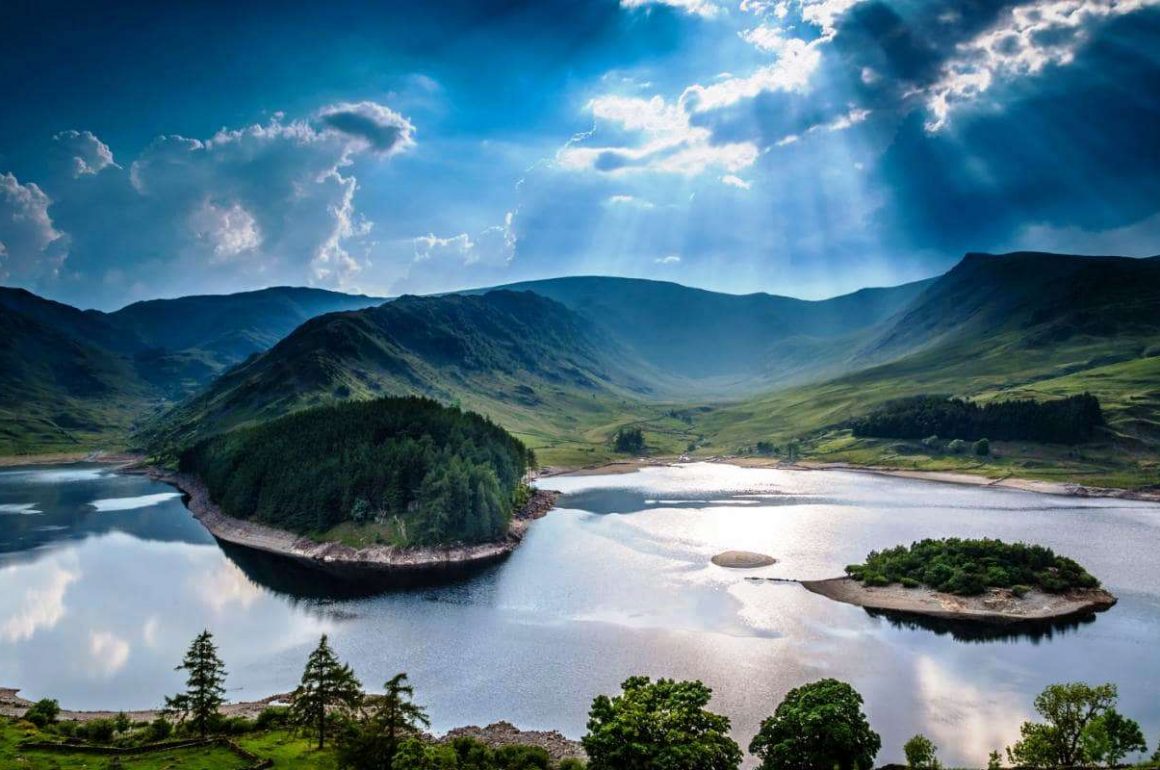
Celtic Life International correspondent Lesley Choyce wanders through Celtic Cumbria.
My wife Linda and I were not at all anxious to leave Scotland but we’d never visited the mountains, lakes and valleys of Cumbria to the south, so now we were headed in that direction from our Argyll cottage. Scotland had provided more mysteries and intrigue than expected and I wondered if we should skip England altogether and gear up for a true circumnavigation of Scotland with our dog in our upcoming trip for later that summer. After all, the Halifax to Glasgow flight was such an easy one.
But then I remembered we could not fly directly anywhere into the U.K. with Kelty in the cabin of the plane. And there was no way we’d allow him to fly the lowest class, which was in with the luggage. British dog lovers should really do something about that rule. Most of Europe allowed dogs in plane cabins if they were as small as our Westie. Why not Britain? “Well, we are an island,” I could hear them say. “We do things our own way.”
Somewhere in some British government bureaucracy was some idiot or group of idiots (they had to be men – men in suits with really clean fingernails) who had come up with the rule. It probably started out as “no animals in with passengers on incoming flights.”
I do believe you can fly out of the U.K. with a dog in cabin if the airline allows – just not incoming. Okay, so I understand that some animals would be disagreeable on long plane trips. Chickens, in first class or coach, would be annoying, as would cows or other barnyard animals. One dog lover in Scotland, after sharing a story about the sadness of the death of his Yorkshire terrier, thought the ruling had something to do with Mad Cow disease, in fact.
 So, yes, I would understand keeping cows out of planes. And snakes for that matter. And most other wild beasts. But rules are rules and stay that way (in the U.K. and elsewhere) until someone has the guts to change them. Perhaps when our travels were all over and I found a publisher for my book, I’d see if the Dogs Trust (formally the National Canine Defense League) might back me in my campaign to allow small dogs to sit at the feet of their owners while eating cardboard tasting wraps on incoming flights to Heathrow, Glasgow, and Stanstead.
So, yes, I would understand keeping cows out of planes. And snakes for that matter. And most other wild beasts. But rules are rules and stay that way (in the U.K. and elsewhere) until someone has the guts to change them. Perhaps when our travels were all over and I found a publisher for my book, I’d see if the Dogs Trust (formally the National Canine Defense League) might back me in my campaign to allow small dogs to sit at the feet of their owners while eating cardboard tasting wraps on incoming flights to Heathrow, Glasgow, and Stanstead.
Such are the reflections on an unexciting drive west and south from Greenock that would take us headlong to England and into the legendary Lake District. On the way down, we were on the lookout for Hadrian’s Wall. During our previous stay in Yorkshire, we never found the wall. And now, outside Carlisle, we thought we could find it or some remnant of it. I could see the dotted line on the map, but it eluded us once again.
Publius Aelius Hadrianus Augustus was a Roman emperor who lived from the year 76 to 138 AD. When he came into power, the empire was vast and he decided to pull soldiers out of Mesopotamia but reinforce domination of other nations, including England. So a wall in the north of England to keep out the rowdy Scottish rascals seemed like a good idea at the time. Machiavelli considered Hadrian one of the “good emperors,” but like so many other historical leaders, there could be a near endless debate as to whether the man was a hero or villain. Anyone could guess that Roman soldiers were not always kind to the folks they conquered, although they did build some pretty snazzy baths in places like Bath and elsewhere.
It may not have come up in most British history classes, but Hadrian was also gay and when one of his lovers drowned in the Nile he designated him a god. He was that kind of guy. His death, by the way, is a bit mysterious: accident, suicide, murder or sacrifice; the jury is still out.
Well, walls fall down, and so did much of Hadrian’s, and that’s probably a good thing.
Good walls make good neighbours, Robert Frost once said, but even he knew that each spring when the ground thawed, rocks would tumble and if you weren’t vigilant, walls would turn to rubble soon enough without human intervention. Around Ireland and England, however, I’d noted that most roadside rock walls were amazingly intact along those narrow country roads that I both loved and loathed. Perhaps there just wasn’t enough frost in the ground to do the job right. I’d lost a mirror or two to those stubborn piles of stone and had a grudge. Maybe that’s why Hadrian’s Wall was hiding.
In the news, Donald Trump, a president that most British citizens were currently trying to keep out of Britain, was promoting his own wall between the U.S. and Mexico, one he was asking the Mexican government to pay for. Such a wall would probably rule out Mexico from becoming the “Fifty-first state,” and would cause endless grief to families with ties to the south, but it does suggest a link between Trump and Hadrian. However, if Machiavelli were alive today, I would bet good money that he would put Trump in the category of “bad emperor.” The British government would eventually – and grudgingly -allow Mr. Trump into the country, but kept him well away from his legions of detractors in London. However, I did detect a certain look on the Queen’s face when she shook his tiny hand? Or perhaps it was just the camera angle.
And so we were headed to the heart of Cumbria, once known as Rheged in ancient Celtic times.
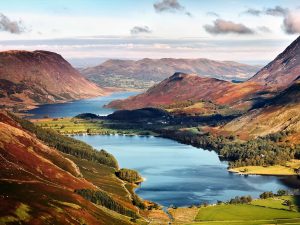 We drove on through the gorgeously bleak, empty high ground and lush lowland forests of the legendary Lake District. Here was truly ancient legendary territory where the early Celts lived somewhat unmolested for 500 years or so until the Romans conquered them.
We drove on through the gorgeously bleak, empty high ground and lush lowland forests of the legendary Lake District. Here was truly ancient legendary territory where the early Celts lived somewhat unmolested for 500 years or so until the Romans conquered them.
We rolled into the town of Windermere and needed groceries so I had stopped at the downtown Booth’s store where I parked in the wrong parking lot – the bus station behind Booth’s. I hung back outside while Linda went in to begin shopping. A soft-spoken man in an official uniform strolled over to tell me in the most polite manner that I was not in the store’s lot but in a public space where I needed to pay five pounds if I wanted to stay parked.
He was obviously someone’s kindly grandfather and knew I was an outsider from the road-weary, slightly stunned look on my face. “I do apologize for the inconvenience and hope you don’t mind,” he said. Perhaps Donald Trump would get the same apology when he would try to visit London again and accept the fact he’d have to keep his ass well outside the capital if he wanted to visit.
In the U.S. my minor violation of plonking my rental car into the wrong parking lot would probably had led to a fine, getting my wheel booted or being towed away. As I watched the parking gentleman amble away, I realized the verb I had attached to his gait came from the fact that there was a nearby town called Ambleside which I assume meant, “This is the side of the lake where we do a lot of leisurely strolling,” in Anglo-Saxon or Middle English.
The streets of Windermere were confusing and crowded as I tried to wend my way to the proper parking lot for Booth’s supermarket where prim and proper men and women, all over sixty as far as I could tell, wheeled those unruly shopping carts filled with groceries and flowers to their cars.
Truth is, we rented the cottage in Windermere because I wanted to spend time in nearby Grasmere, home of William and Dorothy Wordsworth, but we couldn’t find suitably affordable digs there.
Tomorrow we would spend some time in Grasmere and, as I waited in the appropriate parking lot for Linda to emerge with our supplies, I looked over some notes I had brought with me about our current locale. Wordsworth had visited Windermere often, possibly to stock up on groceries himself and have a peek at what folks in the more urbane world were up to. It is safe to say that he liked the lake. Everyone did and still does.
In fact, the lake gets a bit too much love. Lake Windermere stretches North to South like a long crooked finger, carved out of the land by glaciers well before the days of global warming. Towns and forests cling to the shores. Ferries shuttle tourists about and teenagers splash each other from the docks while listing to bad British rap music. Despite the noise, it is still a mighty fine lake.
Back during the Wordsworths’ short tenure here on Earth William was opposed to the building of a railway to carry outsiders to Windermere. He thought it would bring too many tourists, leading to the wholesale ruination of the place.
Like Wordsworth, I’m generally in favour of keeping as much of contemporary civilization as far from my home roost as possible when I can get away with it.
I admit both he and I are a couple of somewhat smug, even selfish poets in our love of nature, and we both know how easy it is for crowds of humans to quickly ruin a fine patch of wilderness.
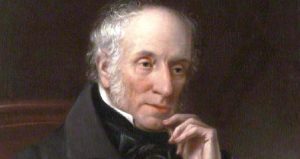
And of course, Mr. Intimations of Immortality was mostly correct about that damn railroad. It did bring legions of tourists and Windermere became a commercial hub of activity worth avoiding. But sitting there behind the wheel of our rental car, I vowed to overcome any prejudice Wordsworth had planted in my head and try to actually like the place. I was, after all, smack center in one of the most gorgeous lake and mountain locales on the planet.
Birthwaite Cottage was a short drive from downtown on a shady street near the shores of the lake on the outskirts of Windermere. It was located on the grounds of a large estate and we were in a very wealthy neighbourhood with houses worth a million pounds or more each. Wordsworth would probably not approve.
I don’t know about you, but I read a fair bit when I am travelling and what I read sometimes shapes the way I experience things, the thoughts that go through my head and sometimes my dreams. In the evening at Birthwaite, I had two books on the go: Man Seeks God by Eric Weiner and How the Scots invented the Modern World by Arthur Herman. Back in Scotland I had grown weary of reading about the religious stranglehold that Calvinism had on the population and how John Knox had preached so vehemently against Catholicism that he’d inspired followers to try to trash beautiful Rosslyn Chapel. So, instead, I turned to Weiner and his chapter about Sufism. This religion seemed appealing to me and a sharp contrast to Calvinism. My experiences in Scotland led me to believe that the Scots had mostly shed their uptight religious ways.
Certainly, contemporary Edinburgh appeared to me as a free spirited place of hen parties, buskers and impromptu musical performances that ended with a young man publicly urinating on a church wall. I wondered what cultural nerve or truth Calvin and Knox had hit upon to convince their followers that the flesh was evil, man was bad and, ipso facto, restraint is paramount and, where that fails, punishment was absolutely necessary.
Sufism on the other hand, according to Eric Weiner anyway, urges its followers to “practice pure love.” Followers claim to be in the world but not of the world and I liked the ring of that. One practitioner defines the religion as “an opening of the heart.” Take that John Knox. Weiner travelled to Istanbul to learn more about the Sufis but I was here in England, far from the spiritual origins of most religions. Some Sufis do all sorts of things to heighten their feeling of enlightenment or euphoria or to come close to experiencing God – including whirling. You have heard of whirling dervishes. I could understand whirling at length would get you high but I didn’t think it would get you high enough to experience God. But there, huddled in a cottage on a fine leafy estate in Cumbria, I vowed that if the right moment presented itself, possibly during a quiet moment in a garden or on a fairly flat top of a fell, I’d give it a whirl and see what happened. And as for religion, I reminded myself, we were in a sacred land. We were currently in the realm of poets and pantheists.
As I set the book aside and lay down to fall asleep, I worried that I had not made any tremendous spiritual connections so far on our pilgrimage. I thought about Wordsworth again and remembered one of my graduate professors labelling the poet, along with a few other Romantic poets, as “pantheists.”
Pantheists saw “God” or some version of spirit in nature. They worshipped nature much like their primitive Celtic counterparts who dug big chunks of granite out of the ground and set them upright in circles to praise the earth, the sun and the spirits all around.
As a graduate student of English Literature, pantheism seemed like such a workable religion that I probably considered myself a modern day pantheist, in league with Wordsworth and Keats and even the “diabolical” Shelley. My classes back in Manhattan were at the City University of New York Graduate Center, what I lovingly referred to as the University of Forty-Second Street, where it was located. I sopped up the Romantic poets like a sponge during three hour lectures and then set out upon the noisy New York streets to look at it all with the eyes of a pantheist.
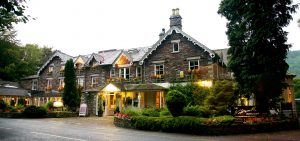
Most everything I saw on the streets was nature in retreat. It was the least Wordsworthian place one could imagine. I was in a used bookstore near the graduate school one day looking for a copy of Thomas de Quincy’s Confessions of an English Opium Eater when the clerk was held up at gunpoint. The robber got some cash and ran and I barely knew that anything had happened. The young clerk called the cops and looked more than a little rattled, so I stayed there and tried to console him until the police came, which was a full half hour later.
When two of New York’s finest finally arrived, chewing gum and looking ever so nonchalant just like those New York cops in the movies, the young clerk freaked out. “What took you so long?” he screamed.
The stouter of the two uniformed men shrugged and said, “Hey, relax. It was only a robbery. We got our got our hands full around here, ya know.”
I had another hour to kill before my next class on the twelfth floor of the grad school, so I went to find solace in the only real green space nearby – Bryant Park, directly behind the famous downtown public library. It was there I sat on the park bench reading the dog-eared copy of Confessions of an English Opium Eater that the bookseller told me to keep at no charge. A young, sad-sack looking man with long shaggy hair – well, not as long as mine, but a tad shaggier – sat down on the bench beside me while I was eating my cheese and bologna sandwich. He didn’t say a word but proceeded to take a small leather kit out of his coat pocket and prepare a needle of something that he then injected into his arm. It was all so matter-of-fact that I assumed he was diabetic. But when he slumped over on my shoulder I got worried and asked him if he was okay. In a dreamy, otherworldly voice that Dequincy would have automatically recognized, he answered, “Yeah, man. I’m real good. But thanks for asking.” I allowed him to lean on me like a lost heroin brother until I finished my sandwich and then, as I got up to leave, I gently lowered him onto the bench to finish off whatever opium dreams would come.
I hear the critics again as I write this. Lake District. Celts. England. Wordsworth. Aren’t we getting just a smidgeon off track?
Maybe yes, maybe no. My mind had drifted. The past was colliding with the present. There in my bed in Windermere, I was trying to connect with the spiritual element that had so far been missing in our travels. Perhaps a visit to Wordsworth’s home would set us on the path. That and a journey to the Castlerigg Stone Circle, created 3500 years ago by Celtic worshippers. Linda was already asleep as I finished reading and ruminating about the urban past and I eventually fell asleep thinking about long gone family and friends.
I guess that’s why I had a dream about Stan Carew. Stan was a guitar player and singer in a band I had formed in the 1990s when I was in my forties called Lesley Choyce and the SurfPoets. Stan was a fine folk singer in his own right who had performed in many rural coffee houses in the U.K. He was a radio DJ by profession in the old days when real DJs gave long deep philosophic commentary between songs. While on air, he had famously protesting by walking out of the station that was in the process of automating its broadcasting to do away with on-air human voices.
Anyway, Stan had died a few years back and that night he appeared in a dream to me at 4am as vivid as a Windermere sunrise. All I remember is me asking him, “How is it where you are?” and Stan, in his usual casual radio-announcers voice saying, “It’s like being in a video.” When I asked what he meant by that, he just splayed his hands out in the air and shrugged like the New York cop and said nothing more.
Semi-awake now in the cottage with the rest of the world still happily snoring, I closed my eyes again to find that 4am connection that Wayne Dyer says we all could have with angels or spirits or whoever is willing to communicate from whatever other dimension. As Stan faded from view, I asked the cosmos a follow up on the Sufi question that had been puzzling me: “What does pure love look like?”
I usually find that communication with spiritual beings is somewhat like having a really slow internet connection but not this time. Whichever angel was monitoring my semi-dream state promptly gave me an image, that of Ozzie, my daughter Pamela’s old American Staffordshire Terrier (also known as a pit bull) who had recently died from a disease passed into pond water by infected raccoons. Ozzie was a large black dog who had been found in the Ozarks of Arkansas as a puppy with a wooden stake driven into him and left to die. He had somehow been found, treated and shipped to, of all places, Nova Scotia to be adopted by my daughter and her small son, Aidan. Despite the fact that Ozzie was a breed of dog that was actually banned in some parts of Canada, he was the kindest, gentlest, most loving pet I had ever seen and helped Pamela and Aidan weather some difficult times.
And there was old Ozzie in my early morning Windermere vision – healthy, shiny, lying on his side in a warm pool of afternoon sunlight. Pure love. I only wish I could have taken a picture for you.
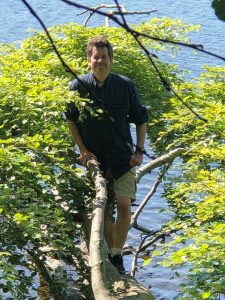
Yes, ole Bill Wordsworth grieved over the railway coming to the Lakes and the crowds that would follow. He wrote, “These tourists, heaven preserve us.” And I suppose that would include Linda and me, here to take in the lakes and mountains and ramble about as if we owned the place. It was still dark out as I lay awake and, from the bedroom on the second floor of our cottage, listening to how ambitious the birds were, many of them joyous and cacophonous well before the sky lightened. William and Dorothy would have been out of bed well before now on a day like this and headed off for a hike of many, many miles.
Today was our day to head north to Keswick and then back down to Grasmere itself, ground zero for Wordsworthian connections.
I was giddy over the idea of simply being here, with my wife and my own intimations of immortality singing to me from every quarter.
Already I was remembering back to my readings of The Prelude in Manhattan and how much the archaic language of Wordsworth’s prose had resonated with me when he mused upon where his inspiration came from. “Emotion recollected in tranquility,” he wrote makes for good poetry. My graduate school professor, who actually smoked a cigarette in a cigarette holder during classes, had taken the trouble to quote T. S. Eliot’s malignant view on this principle. Eliot had written, “Consequently, we must believe that “emotion recollected in tranquility” is an inexact formula – for it is neither emotion, nor recollection, nor, without distortion of meaning, tranquility.” And I had thought, Screw you, frigging Prufrock. Don’t even dare to eat a peach, eh?
Thus there would be no pilgrimages to Mr. Eliot’s birthplace in East Coker. No, today was all about the Wordsworths and connecting with the deep past. I admitted to myself, though, how much tougher it had become these days to find that tranquility the poet spoke of and indulge in the luxurious license to recollect old emotion. But he was right, of course, and I needed to remember that. Once we were young and our emotions were explosive. Once the world really was “Apparelled in celestial light, The glory and the freshness of a dream.” And did we always eventually lose sight of that, each one of us?
It is not now as it hath been of yore;—
Turn wheresoe’er I may,
By night or day.
The things which I have seen I now can see no more.
But enough of that, I said to birds outside my window, as I got up to make us coffee.
We passed through Grasmere first and then north along another skinny glacially-formed finger lake known as Thirlmere with the heights of Great Dodd to the right and High Seat to the left. First stop was the stone circle called Castlerigg just shy of Keswick.
Rather than driving into Keswick and following well positioned signs on a substantial road, I took a shortcut I saw on my map which turned out to be yet another single-track lane with stone walls on either side and no pull offs to speak of. I booted it down the road lest we encountered an advancing car and it blessedly spilled us out the other end into a well-marked parking area and a field of visitors snapping photos with absurdly long-lensed cameras.
Wordsworth took his druggie buddy Samuel Taylor Coleridge here in 1799 and the author of “Kublai Kahn” wrote that here was “…a Druidical circle…the mountains stand one behind the other, in orderly array as if evoked by and attentive to the assembly of white-vested wizards.” The two poets did note that some of the stones had been splashed with white paint by vandals or sloppy eighteenth century graffiti artists but that couldn’t quite diminish the full grandeur. On another occasion, Wordsworth and Dorothy visited Castlerigg only to discover that those damn tourists from the south who had come in on the Windermere train had found it out and it had completely lost its charm due to the crowds.
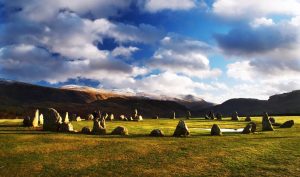
More recently, Lonely Planet described it this way. “Set on a hilltop a mile east of town, this jaw-dropping stone circle consists of 48 stones that are between 3000 and 4000 years old, surrounded by a dramatic ring of mountain peaks.” Jaw-dropping, I will admit, is not an exaggeration. And hey, it’s older than Stonehenge by a few thousand years and it has been determined the circle served some sort of astronomical purpose as well as a spiritual dimension because, even today, locals see strange lights coming from the stones at night.
I was just happy to be here, sidestepping sheep poop on such a generous morning and gloating over the fact that this ancient structure was less developed than Stonehenge and had a much grander view of the country around it as Coleridge had noted.




















Leave a Comment